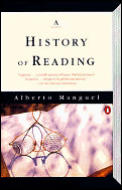
by Paolo Freire
Our essential function: a review of A History of Reading
By Phoebe Ayers, MLIS Day
Alberto Manguel's 1996 book, A History of Reading, is a glorious exploration of the act of reading. Manguel discusses how and why we read from a neurological viewpoint (how do we interpret words?), from a cultural viewpoint (when did silent reading and reading in bed become common?), and from a historical standpoint (how did the closeted women in Heian Japan become readers and writers?). The book also is a personal memoir. Manguel examines his own experiences with the written word, recounting anecdotes of growing up with certain stories, of reading aloud for Jorge Luis Borges, and of buying books around the world.
Manguel's scope is exceptionally wide-ranging and his prose is erudite; at the same time, it is far from being a dry scholarly work. There are numerous endnotes, and I found myself consulting them often out of curiosity. Manguel mentions countless odd, interesting items, presenting them with the grace of someone who knows something offhand. Elsevier publishers, for instance, apparently were known particularly for their cheap paperbacks that were popular with a lower-class audience in the 18th century, something the Earl of Chesterfield mentions in a letter - the type of detail that one wonders how in the world Manguel dug up. If A History of Reading has any fault, it is that Manguel tends to wax excessively poetic - a fault that can perhaps be forgiven, given his deep involvement with the subject.
But more than a curiosity cabinet, Manguel's work has the scope and scale to cover the varieties of reading that can exist in the world. Silent, out loud, public, private: Manguel, as a perceptive and literate reader himself, finds aspects of the act of reading that, while one may have experienced them personally, are made explicit and thus new. Instead of simply presenting an account of famous books or publishers or libraries, Manguel always manages to return his focus to the act of reading itself. In fact, this is very much not a book about libraries: Manguel writes: "Classifications are exclusive; reading is not - or should not be. Whatever classifications have been chosen, every library tyrannizes the act of reading, and forces the reader - the curious reader, the alert reader - to rescue the book from the category to which it has been condemned" (emph. in orig.)
There have been many books that have chronicled the history of a particular concept across time and cultures in recent years, and while A History of Reading could fall into this category, I think it is something more, that Manguel gets at something fundamental about the nature of literacy itself. Ultimately, this book is successful because it will resonate with any dedicated reader. I found myself emotionally moved at some of Manguel's delicate and sympathetic descriptions of something that I have been passionately involved with for most of my life. I'm not sure that the book would make much sense to anyone who wasn't a reader. But for those of us who are, Manguel touches a nerve and shows us that, throughout history, we are not alone. As he writes, describing his own experience of learning to read:
The readers of books, into whose family I was unknowingly entering (we always think that we are alone in each discovery, and that every experience from death to birth, is terrifyingly unique) extend or concentrate a function common to us all. Reading letters on a page is only one of its many guises…. We all read ourselves and the world around us in order to glimpse what and where we are. We read to understand, or to begin to understand. We cannot do but read. Reading, almost as much as breathing, is our essential function.
Manguel, Alberto. A History of Reading. Viking Penguin, 1996.
